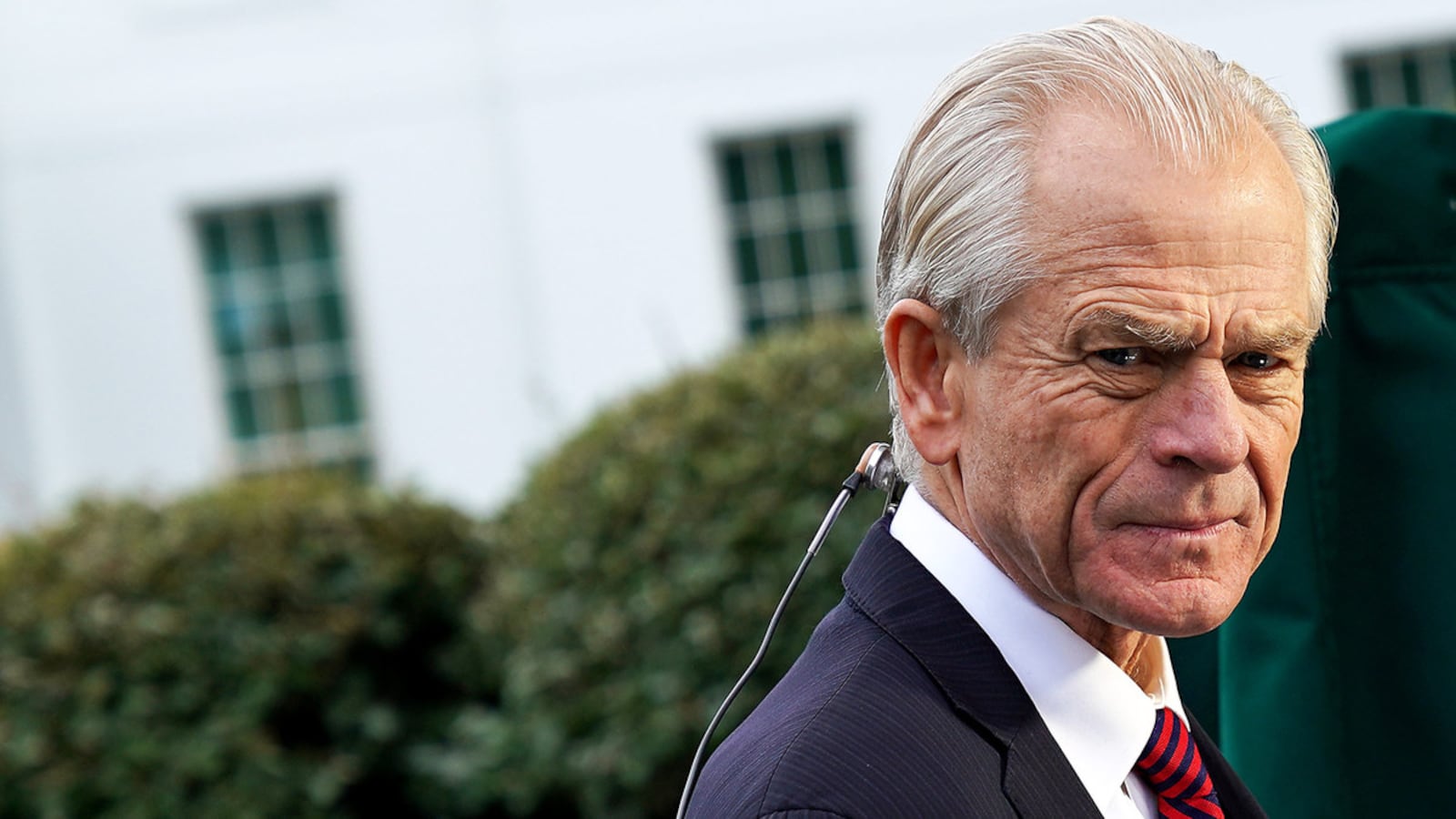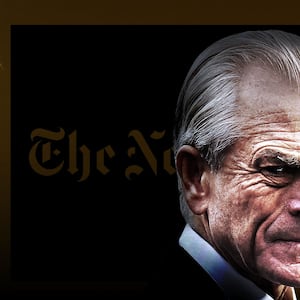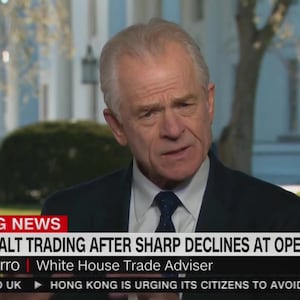White House trade adviser Peter Navarro has seized on negotiations over how to handle the economic fallout of the coronavirus to push President Trump to use the crisis to bolster his “Buy American” agenda—starting with domestic production of key medical goods and equipment.
His role, as described to The Daily Beast by several officials, has been aggressive enough to prompt serious pushback from other senior Trump officials, who are worried that Trump will be won over by the Buy American pitch, which will, in turn, have damaging consequences during the nation’s worst public-health and economic crises in years.
The order being pushed by Navarro, a draft of which was obtained by The Daily Beast, lays out a slew of policies that would ultimately curb the importing of foreign goods and create conditions that would allow for the increased production of American medicines, raw materials, and vaccines. The order is similar in language and tone to Trump’s April 2017 executive order “Buy American Hire American.”
In an interagency meeting last week, representatives from the Food and Drug Administration (FDA) and other trade officials voiced their objections to Navarro, saying the executive order could create more harm than good by restricting the flow of medicines and other supplies needed to treat coronavirus patients, according to two individuals familiar with the conversation, including one with direct knowledge.
Navarro is an infamous China hawk who has long appealed to Trump’s America-first instinct on trade policy. And according to two administration officials, he has been working on drafting his order with the president’s explicit sign-off, having personally pitched the idea to the president in recent weeks, according to two administration officials.
“The president warmly received it and told Peter to get to work on it,” said one of these officials—who stressed that they were not on Navarro’s side in this policy fight. “[Navarro] is not freelancing this... This is something the president [repeatedly] said he wanted done.”
That Navarro has found himself playing an integral role in response to a massive global pandemic illustrates the degree to which economic concerns have guided the president’s response to the crisis. But there is hardly uniformity within the administration about what constitutes the right approach.
Other high-ranking Trump lieutenants, such as Treasury Secretary Steve Mnuchin and the president’s top White House economic adviser, Larry Kudlow, have also voiced internal opposition to Navarro’s plan, arguing that if Trump were to do this during a pandemic and economic crisis, it could risk making problems worse, according to two sources with knowledge of the situation.
Navarro’s initiative has also run into expected objections from industry executives, as well as Republican veterans of past administrations. Tony Fratto, a White House and Treasury official during the George W. Bush presidency, knocked the proposed policy as “a mistake,” posting to Twitter that “pandemics are global” and that “we need greater cooperation, not keeping critical supplies in walled gardens.”
White House spokespeople, Kudlow, and Navarro did not respond to requests for comment by press time Wednesday. The departments of State and Treasury and the FDA did not provide comment either.
The internal administration dissent comes at a time when Trump’s coronavirus task force is struggling to handle the growing requests for medical supplies. While the federal government has begun distributions, governors across the country have said publicly they are in need of tens of thousands of additional masks, gowns, and gloves. Officials working on bolstering the supply chain tell The Daily Beast that further impeding the flow of goods by cutting down foreign supplies could make matters worse.
“The crisis has revealed there are lots of vulnerabilities in, specifically, medical supply chains, and thinking through what the U.S. policy should be is a good thing,” said Geoffrey Gertz, a fellow in the Global Economy and Development program at the Brookings Institution. “The question is how best to do this in a crisis. If there isn’t an ability to ramp up productions of those goods, then it doesn’t really work. You can’t instantly flip the switch and have factories start pumping out these goods. At the moment where there is huge demand from medical goods. You want to source them from as wide a range of suppliers as you can.”
Navarro’s executive order, titled “Combat Public Health Emergencies and Strengthen the National Defense by Ensuring Made in America Essential Medicines and Medical Countermeasures,” is designed to lure companies to the U.S. and to incentivize more domestic production in the long term. One section allows for any executive agency or department to procure essential medicines and other supplies from “any sources during the COVID-19 outbreak.” But in the next several lines, the order says officials have to “take all possible measures” to “maximize domestic procurement of essential medicines” over the long term.
The order says it is the policy of the U.S. to “protect our citizens… against the outbreak of dangerous infectious diseases” and “restore the capabilities of our Public Health Industrial Base that are essential for the national defense and the development of production capabilities.”
The draft executive order goes on to lay out U.S. policy as it relates to the supply chain of medical supplies, stating that the U.S. should “ensure sufficient, stable and reliable long term demand for essential medicines and medical countermeasures through domestic procurement policies.” In doing so, under the executive order, the U.S. would accelerate the regulatory approval times for medicines and increase enforcement of FDA regulations outside the U.S. to the same level that is enforced in the U.S.
The heads of the departments of Defense, Veterans Affairs, and Health and Human Services would also be given 90 days to procure American-made medicines and “promote price competition by dividing production requirements among two or more domestic contractors.” Sometimes when federal agencies buy foreign products, they’re able to do so by obtaining waivers from the administration. But Navarro’s executive order would eliminate some of those waivers.
“This seems like they’re running ahead with policy without understanding the real source of risk,” Gertz said.
Navarro’s attempt to bolster domestic manufacturers as a component of the medical-supply chain comes at a time when others inside the administration are still trying to get a good grasp on how the medical-supply chain is currently functioning. In particular, trade officials were alarmed by a component of the draft executive order that designates so-called APIs [“active pharmaceutical ingredients”] as “critical technology” that are “essential for the execution of the national security strategy of the United States.” API is any substance or mixture of substances intended to be used in the manufacturing of a medicinal product that, “when used in the production of a drug becomes a drug product, becomes an active ingredient of the drug product,” according to the executive order.
In an interagency call last Friday, officials from departments including Commerce, State, FEMA, and the National Security Council talked about the impact of the coronavirus on the global supply chain.
Two officials with knowledge of the call said representatives of the NSC acknowledged that they were following shortages of hand sanitizer through press reports. FEMA officials said they did not have insight into global inputs to the supply chains. Officials on the call seemed to be confused about which agency was in charge of tracking that information. Part of the disorganization in conversations about the supply chain was related to the lack of communication with the White House and the task force, those sources said.
Asked for comment, a spokesperson for FEMA said that it was the Department of Health and Human Services that was responsible for “planning and assessing needs for personal protective equipment.”
The NSC did not respond to a request for comment.
Beyond being an adviser on trade policy, Navarro has fashioned himself as a staunch, pugilistic Trump loyalist in the administration, going as far as to secretly hunt for “Anonymous,” The New York Times bestselling author and op-ed writer who emerged as a nameless, Trump-bashing “senior administration official.”
For years, he has become accustomed to being surrounded by personal and ideological enemies within the Trump administration, hanging on in part because the president has such personal affection for him. President Trump has been known to call Navarro “my Peter.”
But his proximity to Trump and the dogmatism of his views has also earned him his fair share of enemies. Navarro and Mnuchin have feuded in the Trump era before, including during a profanity-laced, face-to-face dispute—characterized at the time by administration officials as a “screaming match”—during a high-profile official trip to China in May 2018.









